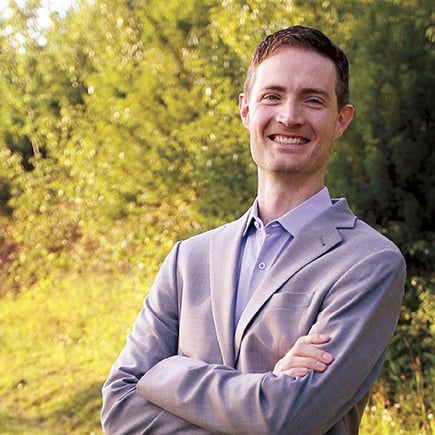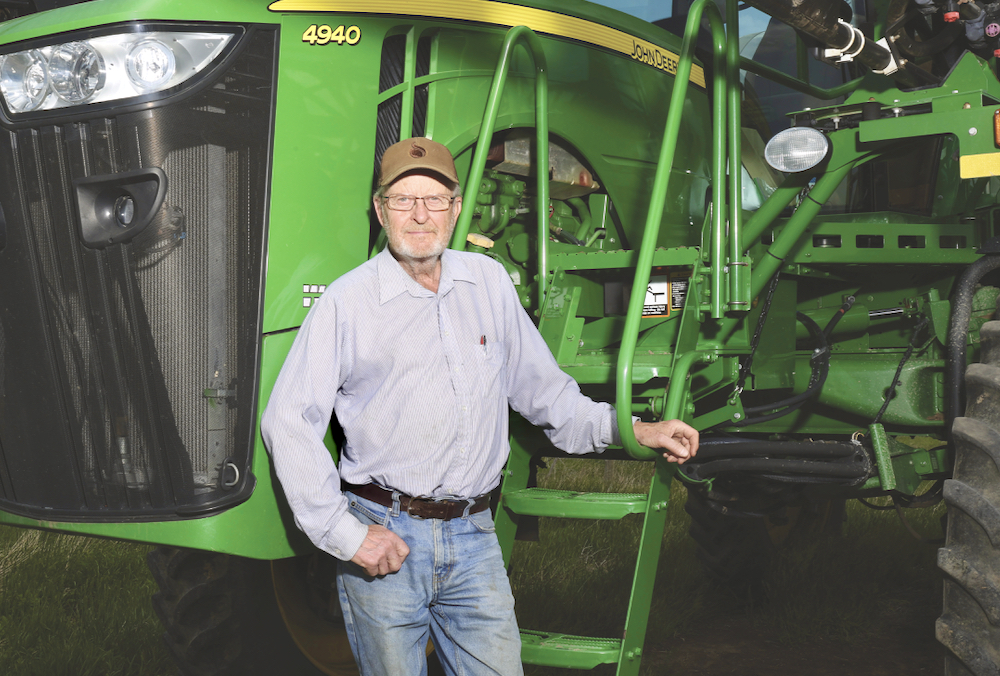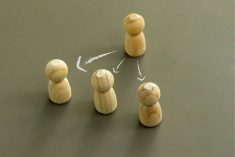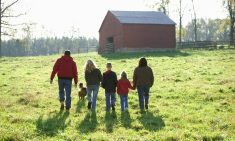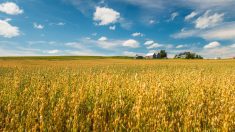Glenn Logan has two projects on the go that are taking a pile of his energy at a time in his life when many farmers are happy with what they have already accomplished. And once again, his projects are raising eyebrows.
Partly, that’s because the Alberta farmer has decided to take 920 acres out of production and create two solar farms, one 600 acres in size, the other 320.
That’s right. He’s a farmer who is taking farmland out of crop production in an era of historically strong prices.
Read Also
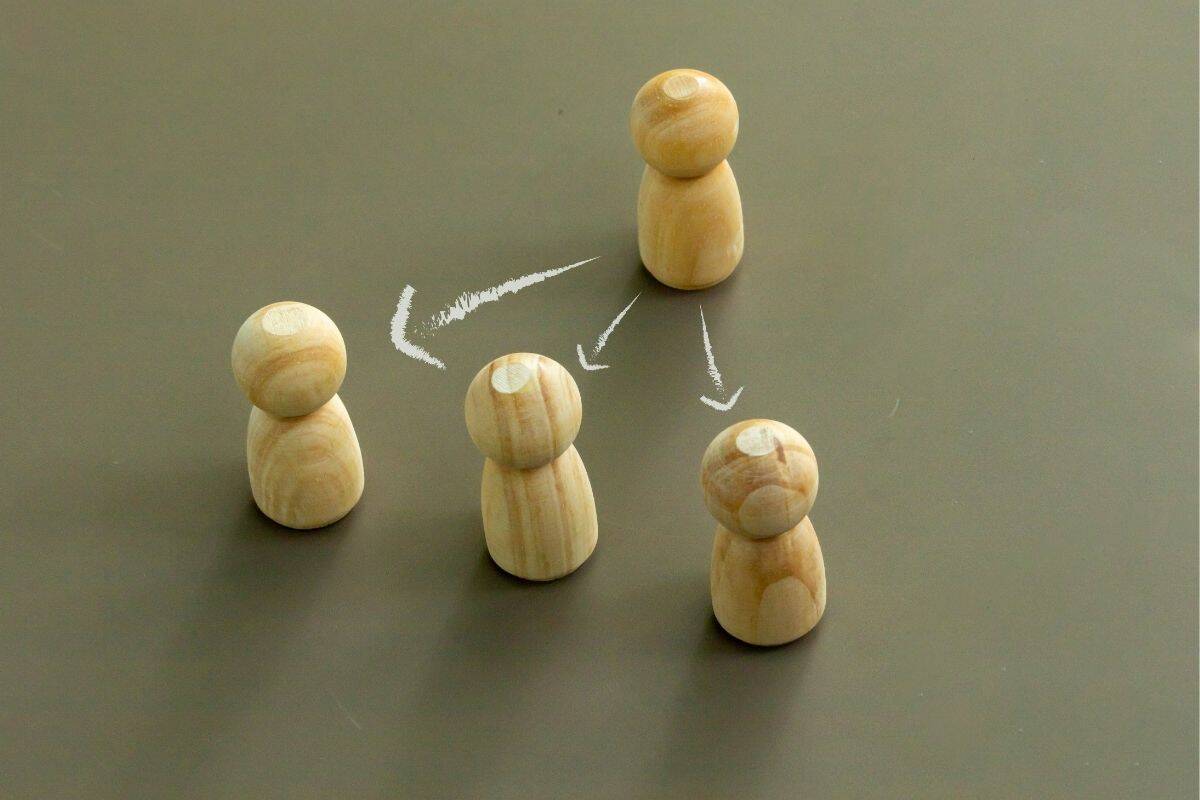
Executive decisions: what and when to delegate on the farm
Consider the end state you’re working to achieve on your farm when deciding what tasks to delegate, when to do so and on whom, farm management advisors recommend.
Instead, his panels will generate electricity that will be sold into the grid where they will power the equivalent of 65,000 homes.
Not wanting to waste a square inch of land, though, Logan’s granddaughter Hannah manages a 150-head sheep herd that will graze underneath the panels.
His second venture is as a member of the Buffalo Plains Wind Project, which will soon see 83 additional wind turbines dot southern Alberta’s landscape, six of which will sit on his own property.
Once built, each turbine will be about the height of the CN Tower.
But he’s also raising eyebrows because it’s in his nature. In any community, there are people we listen to. They have a way of thinking that seems to resonate. We might not want to be like them, but we do pay attention.

If Logan knows this, it doesn’t drive him. Instead, he’s is a soft-spoken 70-year-old who chooses his words carefully, isn’t afraid to think before he speaks and knows the value of time gone by when he judges a business move.
Sometimes, too, he ruffles feathers.
In the right context, in fact, Logan believes feather ruffling is part and parcel of doing good business.
What he points to, though, is that he has spent most of his life at Lomond, Alta., a farming village an hour north of Lethbridge. He and wife Marie farm on land that’s been in the family more than 115 years and now includes a feedlot and seed cleaning facility.
Unabashedly, his pride and joy is the Lomond community. It’s the individuals and families that comprise the surrounding area. Virtually all of his decisions are business decisions made with money in mind, but people, jobs and longevity are there too. If an idea doesn’t tick those boxes, the value proposition becomes increasingly tenuous.
When it does strike the right note, though, Logan is keen to pounce and will often act fast.
He accepts as fact that there will always be naysayers who are stuck in neutral and apt to criticize a sunny day. It doesn’t stop him. When he decided to build hog barns in the early 2000s, for instance, he was new to swine. People said it couldn’t be done. Still, he built the barns, created 15 permanent jobs and generated 1.2 million bushels of new demand for feed barley.
When he knew the barns had momentum and the community had grown and the jobs wouldn’t be lost, he sold the business. Later, after a Alberta barley commission trade mission to the Middle East, he sensed opportunity and began shaping deals with buyers in Dubai and Iraq. It was just after the Arab Spring ended, but Logan was undeterred.
Oh, and those two electric projects? They’ll create a dozen full-time jobs too.
Straight from the hip
Across a career full of bold, sometimes unexpected moves, how has Alberta’s Glenn Logan made his biggest decisions? What separates the do’s and the don’ts, and how does he get to “When do we start?” (Note: The following interview has been edited for clarity and length.)
Country Guide: You have directly marketed your own crops around the world and made it a point to travel to those destinations and meet buyers. Share your motivations and perspectives gained.
Glenn Logan: Who in their right mind would travel into the Middle East, especially just as the Arab Spring was ending? People I know still haven’t got over that, why I would want to be bothered doing that. It was huge. It makes you think differently about the world. You have to respect others. Everybody doesn’t think the same. I’ve built up a large network and it’s been all to my benefit. There are opportunities everywhere you look, you just have to pick and choose what might work for you.
I have Muslim friends and they’re the first ones to call and wish me a Merry Christmas, the first ones to wish me a happy Easter, and we think of Muslims as a bloodthirsty bunch of people. They’re not. They just like us.
It was just an opportunity that came up, not knowing if there was going to be any success in it, but I had to try.
Don’t ever be afraid of failure, that’s where you get your most experience. When things don’t go so well, you learn to do things differently and you learn from your mistakes.
CG: Talk about the farm and how it’s changed over the years.
GL: We started in 1972 on a quarter-section. We were able to rent more land and take over more family land, as well. We developed that into a lot of irrigation over a period of years. We haven’t expanded in the last 10 years, we’ve focused our efforts on other things. We got into the seed business with a seed cleaning facility in 1995 as a way to create revenue for another generation starting on the farm.
CG: Tell me about your solar farms currently under construction. You were harvesting crops, but soon you’ll be harvesting the sun. Some see this as a savvy business play while others cannot understand why a person would take prime farmland out of production.
GL: I see it as taking the best advantage of land. That was a business decision; it provides opportunity for others to replace that void. If I don’t produce it somebody else will. I guess I don’t have any qualms about taking it out of agricultural production. Canada hasn’t had a food security program, still doesn’t have one. At some point in the country you have to do some long-range planning if you want to get into that food security game. If you could see in the future farther down that road than what they’ve been able to see in the past, things might have been different. Food is going to be worth a lot money, energy is going to be worth a lot of money. Whether I am producing energy or potatoes off that land, it’s revenue. Both of them are money. The other part of that is it creates employment in rural areas. That’s hard to come by of any kind. It will put kids in school, parents in homes, businesses in communities, creates a lot of other opportunities for other people.
I don’t feel any guilt about that. You can be mad about what your neighbour is doing. If you want, you can waste your time and be mad about everything. I look at everything as an opportunity. I’ve been criticized a bit for it, but I think people understand it generally. It’s not for everybody, and everybody is not going to be doing it. On the overall scale of things, it’s pretty small peanuts.
All these projects are going to create some permanent jobs and you need to live somewhere. I don’t see anything wrong with that.
It’s the same thing with hog barns we built. They created jobs in the community, created over a million-bushel barley market that wasn’t there before. Most of the families we employed in those barns went through school with my grandkids. There were some families that came over from the Philippines that are still working in those facilities, still living in the community. Their kids have graduated from school and moved on, but the families are still here. It makes you feel good to know you had a little bit of an impact on the community.
CG: Is it the same with the wind farm?
GL: Windmills, they stick up in the air a long way and are a bit of a sore thumb on the Prairie landscape … Small communities don’t get to pick and choose sometimes. It’s not everyday you get a large project that is going to pour some money into a community. A lot of small communities would die for any kind of economic development. You see governments spending money at every level. How do we attract investment? It’s not easy. Sometimes you can’t pick your opportunities. They pick you and you have to grasp them.
We always knew southern Alberta wind blows incessantly. So, wind companies see those maps where it works to their best advantage and in relation to the infrastructure like electrical. You don’t always have to go out and beat the bushes, sometimes they’ll come and find you if they see a suitable location. It was an easy decision. We saw it as economic activity in the community. It had its negatives but the positives outweighed them in my mind.
Everyone had a chance to participate … some saw them as an eyesore where other people saw them as an opportunity and welcomed them onto the land.
CG: Tell me about your passion for both agriculture and people. Where does your inner drive come from? Many people happily farm, punch a clock and head to the lake when it’s nice out.
GL: It started with the Canadian Wheat Board. I was never happy turning my efforts over to the Wheat Board to market on my behalf. I and others farmers never thought we got the true value for what we produced. That’s where the incentive is, always to do better. If you can make money sitting on your hands going to the lake every other weekend and working five days a week, that’s fine. We were never happy with that. We always wanted something more.
It goes back to a sense of community, not just my local community here, but the agricultural community. We wanted to see it succeed and prosper. It’s been a long haul, it hasn’t been easy. A lot of people are doing exactly what I’ve done. I’m by no means unique in that. Lots of effort has been put in to make agriculture a better place.
CG: You say you wanted “something more.” Explain that.
GL: We wanted to create an environment where our kids, if they so wished to stay on the farm, could, and prosper. It got to be the same with grandchildren. We wanted to create something for them where they saw a future as well. They’re all not going to stay on the farm, but some have and probably some will yet when it comes time.

CG: Why is it important to you to have that prosperous nature, a strong community and all those good things?
GL: Sometimes you ask yourself that question a lot. Everything you do doesn’t succeed. You get beat up a bit and sit back and lick up your wounds. In a matter of days you get over that and go at it again. Try it again from a different perspective and different angle and a desire to succeed. It’s hard to compare it to a game, but there’s a certain drive with a lot of people. I like to think I have that drive.
CG: Where did that come from?
GL: My parents were quite happy with their lot in life. I was born and raised in Saskatchewan and left to go to university. I guess it’s the experiences you gather along the way, the people you met and had conversations with. You start to look at everything as an opportunity and you want to explore that opportunity until it gets to a point where it’s a go or it’s not a go. It’s hard to explain. You just get out there and try to take advantage of everything the world has to offer you.
CG: Was there something when you were a younger man, when you tried to explore something until it was a go or not a go?
GL: We built the farm up. We started small and built over our lives on the farm to what it is today, and have been pretty successful at that. We’ve proved that with the length of time we’ve been here. In your life you always make mistakes, but you don’t let it defeat you.
CG: What is your philosophy when you inevitably taste defeat?
GL: I don’t know what it would be. You have some pretty frank discussions with your family. You want to leave the world a better place than when you arrived at it. There’s a whole lot of things. Maybe it’s a sense of community or obligations to society to make it a more successful place to live. We’ve been lucky in Canada — terribly lucky in Alberta — you must look at it from a larger perspective than just your little world around you.
CG: Are there certain things you point to or say here is a concrete example of how lucky you are to live where you live or have an opportunity that kick-started positive things in your life?
GL: I hate using the word lucky too often. If you see the opportunity … when you do you better grasp it and run with it until you find a good reason not to. Then you look for something else. Not all of them are going to be successful.
CG: When we talk about all these business opportunities, I’m curious, where does this vision come from?
GL: You take stock of what resources you have available at the time, what you can do with those resources, and the knowledge you have and build something from there.
CG: Where does your ambition come from? And what are yours?
GL: I’m sort of semi-retired, I help where the farm needs help, but I’m anxious to see how my son’s family and my grandchildren are going to succeed in this land. We’ve been here a long time. We’re just caretakers of the land. I guess that’s what drives me, I want to make life better for them.
CG: What does your family mean to you?
GL: I would use that word lucky, reluctantly. I’ve got eight grandchildren right now and am so fortunate they’re close by and all involved in the farm somehow. I’m fortunate to be involved in their lives in some respect, as well. What both Marie and I have done, that’s what’s driven us. We want to turn over to them and see them succeed on the farm.
CG: What are your biggest challenges today? Or for any farmer for that matter.
GL: I think it takes perseverance. I think anyone that’s involved in agriculture knows it takes perseverance. Canada is rather a hostile place to be in ag. We have a huge variance in weather — from floods to drought and everything in between, frost and snow at inappropriate times. You can’t be a quitter and be a farmer.
CG: What do you say to younger farmers exploring business prospects?
GL: I’m not in the habit of telling people what I think is right. I have no idea what’s right for them and the situation for them that they’re in. All you can ask people to do is take a chance. You might fail, but pick yourself up and take another chance. Eventually find one you’re very good at.
CG: What are the characteristics of good businesspeople?
GL: I’m not saying you need a formal university education. You have to be dedicated to do the best job you could possibly do under some very trying circumstances. The education you get is probably not going to prepare you for some of the obstacles or pitfalls you’ll face in life, but you have to be resilient. You have to establish your goals. You have to attack them with energy. I think farmers are not recognized for their special abilities. There are thousands more just like me doing the same darn thing. They all have the same mentality and keep at it until you succeed, don’t give up. It was Winston Churchill that famously said, “Never, never give in.” Those few words are very powerful. I look at people who have similar attitudes in life, not just in agriculture.
CG: Who are your heroes?
GL: Most of my heroes tend to be political: Churchill, Margaret Thatcher, George W. Bush. In agriculture, Gerry Ritz had a lot of courage. He relieved us of the burden of the CWB. (Former federal agriculture minister) Eugene Whelan was a liberal. I never agreed with a darn thing he said, but he was a big booster of agriculture and you had to respect him for that. It would be a dull world if everyone thought the same.
CG: Why is having a healthy, thriving community such a big focus for you?
GL: Let’s go back to business. If there wasn’t community, if there was no place to buy fertilizer, or crop inputs or groceries, that would be a big cost to me. I’d have to drive to Lethbridge or somewhere to get what I needed locally if only I had (a) bit of support. My kids and grandkids would have been on a bus for two hours to get to a school if there wasn’t one here.
CG: Do you see this as your duty as a citizen of the community?
GL: Everybody has a responsibility to the country and society in one way or another. Everyone needs to do their part. I’ve always been on economic development organizations and always wanted to contribute not only to my community, but also the larger community. Rather than going outside your community for everything, let’s see what we can do within.
CG: How would describe yourself?
GL: I’ve often asked myself and others: if your grandkids were looking at your tombstone what would you like to read. My answer has always been, “He cared enough to make a difference.”
Right and wrong
CG: How do you know a business idea is right for you?
GL: I think you have to trust your gut. It’s hard to describe, it’s a feeling if it will work or won’t. If this might be good for you, then assemble a team of lawyers, accountants, knowledgeable people or anyone that might relate to the project and take that approach.
Just because you have a gut feeling and have sold yourself, you still need people to help on the due diligence.
CG: How do you know if a business idea is wrong for you?
GL: You look at the resources you have at hand. Do you have the resources for the project? Does your location suit it? What about transportation? Energy supplies? All that leads to a successful venture.
Recently, everybody was excited about growing lupins. I was excited about it, too. However, my soil pH is too high to successfully grow them. That’s one of those things we discard. If you decide not to do something, you get on with another idea or another project. Don’t dwell on what the past held for you.
CG: How do you get other people on your side by building relationships and influence?
GL: Quite often you have a large personal network and inevitably someone within your contact list has done a similar or the exact same thing. If you have developed and held that relationship you can talk to people that have done it. It’s a proven idea. It might not even be in Alberta, it could be virtually anywhere.
Giving back
Beyond the farmgate, the most common place to find Glenn Logan is sitting around a boardroom table or speaking with politicians and bureaucrats at all levels of government. That’s because he made a second unpaid career of being an industry advocate. It’s said that policy is made by those who show up and many organizations have had Logan show up for them time and time again. Below are some of his industry involvements past and present:
- Alberta Barley: Past board chair and director
- Alberta Beef Producers: Past director
- Vulcan County: Past councillor, three terms
- Alberta-British Columbia Seed Growers: Current national director, past vice-president, president and past president
- Canadian Seed Growers’ Association: Current second vice-president and director
- Ag for Life: Current board director
- Beef Information Centre: Past director
- Canadian Cattlemen’s Association: Past board director
- Bow River Irrigation District: Current board director
- Alberta 4-H Foundation: Past vice-president, president and past president
- Agriculture & Food Council of Alberta: Past board member
- SeedNet: Founding member, current director and vice-president

